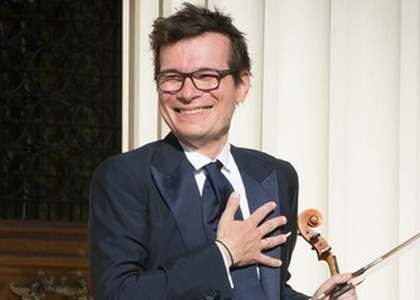> [Archived] Interviews

Interview with Alexandru Tomescu
On November 18th, the "Wind, Water, Earth by Dan Popescu" tour will begin, supported by violinist Alexandru Tomescu, pianist Sînziana Mircea and cellist Ștefan Cazacu. We learn details about the works included in the recital from Alexandru Tomescu.
Mr. Alexandru Tomescu, what convinced you to join the project "Wind, Water & Earth" by Dan Popescu?
It's a very daring project because it offers the public a series of first auditions. There are some works composed by Dan Popescu for violin and piano, cello and piano or for trio (violin-cello-piano), works with which I felt that I resonated. They are extremely romantic in writing. And basically this tour is a continuation of the first one we started in the spring. Everyone was excited, many people asked why we didn't reach them too, and then we decided to continue and do the autumn stage as well.
The title of the tournament obviously means "Wind, water and earth", the three essential elements that inspired Dan Popescu. He even assigned each of the instruments one of the three elements. So there is much more than music in what we play for the concert-goers.
What were the impressions at the first reading of the works included in the "Wind, Water & Earth" project?
They are some very spectacular works, extremely meticulously written - here you can feel Dan Popescu's inclination towards accuracy. He is an engineer by profession, but he has been studying composition for many years, he also plays the piano... It was very interesting to meet Dan Popescu personally, because he explained to each of us what it means, what was he thinking about, what was he feeling when he composed each of the works, and in that way we were able to connect much better with his sensibility and the sensibility of the works.
So what are the challenges and opportunities that come with performing scores in such close connection with the composer?
On the one hand, it is a great privilege to be able to dialogue with the composer - this is no longer possible with Mozart, Beethoven or George Enescu. Of course, it's also a great responsibility, because not even the smallest note can be wrong because he knows every single one - every note, every break, every timing has to be exactly there, in its place. The greatest joy is when I see the emotion in Dan Popescu's eyes at the end of the concert. Sometimes it's even teary-eyed from so many emotions, so much living... Music speaks directly to the soul and it's really something very special to be able to sing music composed right then, with the composer in the room. Everyone important is gathered there.
What is the musical course of the performed works? Are they intended as a cycle or as stand-alone pieces?
They can also be sung individually, of course. But we, for this tour program, thought of them in a certain sequence. There are some violin pieces, then cello, then we sing together, and again... it's a continuous variation of the musical distribution. And of course we end up singing all together. We also have a very nice encore piece made especially for the tour and... I'm really looking forward to the first concerts.
The violin, piano, cello formula is one of the classical chamber structures. How would you describe the result of integrating this formula into a contemporary score?
It's a very wise choice, I might say, because basically the violin and cello together with the piano can reproduce almost all the sonorities of a small orchestra. The works are post-romantic, I would say, because this is also the nature of Dan Popescu - an extremely sensitive and expansive composer. And I think that the expressiveness of the violin, the deeper timbre of the cello, and all the registers that the piano covers... all these things put together can only work very well.
Translated by Medeea Alexandra Stan,
University of Bucharest, Faculty of Foreign Languages and Literatures, MTTLC, year II
Corrected by Silvia Petrescu














